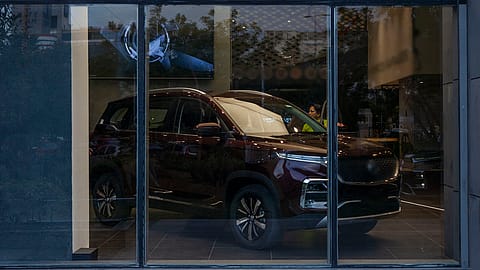Govt needs to clarify on how dealers can claim credit of cess worth ₹2,500 crore: FADA
The government needs to clarify how we can claim credit for the taxes which we already paid but may not be paid by the customer, says FADA president C S Vigneshwar.

The Federation of Automobile Dealers Associations (FADA) wants the Centre to clarify how dealerships across the country can claim credit for the taxes they have paid, which the customer will not pay for vehicles sold from September 22, 2025.
"The cess alone accounts for about ₹2,500 crore. That’s not something that dealerships can absorb. We really need to talk to the government. The government needs to clarify how we can claim credit for the taxes which we already paid but may not be paid by the customer,” FADA president C S Vigneshwar told Fortune India.
About 6 lakh vehicles would likely be impacted by this issue, said Vigneshwar. “The ministry should clarify and they need to do it fast because the festive season is coming. We don’t want our capital to be blocked. There is a lot of interest that we end up paying,” he added.
At the time of wholesale, when vehicles are shipped from the factory shop floor to dealerships, the OEM (original equipment manufacturer) issues an invoice to a dealer. Dealers then invoice the customer during retail sales. Many OEMs curtailed dispatches of bigger SUVs following the announcement made by Prime Minister Narendra Modi on August 15. The new reduced tax rates on cars will come into effect on September 22, 2025.
“We have taken a very conscious call by calibrating our dispatches to the dealers. Many OEMs have taken a call not to push the vehicles to dealerships,” Partho Banerjee, Senior Executive Officer, Marketing & Sales, Maruti Suzuki, told reporters on September 1, 2025. Maruti Suzuki's network stock increased to 48-50 days in August from 38 days on average.
Applauding the government for reducing the Goods and Services Tax (GST) rate on cars and two-wheelers, Vigneshwar said that the government had done a little bit more in terms of reduction in the entry-level segment, two-wheelers and four-wheelers, which had been facing some headwinds in the past couple of years.
“This will change consumer behaviour and buying patterns. The overall cost is going to come down as inflation is going to drop. For auto dealers, in the mid-term and long-term, it is fantastic. We are going to sell more vehicles, so it is going to be great for us. But in the short term, we need to find out how the government is going to help us to take care of this gap,” he said.
Recommended Stories
“The government also has to clarify and tell us how we need to deal with cess. Once these two things are done, it will be great. Otherwise, it’s going to be a huge burden for the dealers,” he said.
When asked if the FADA supports the GST Council’s move to increase the tax rate on motorcycles having engine capacity of over 350cc, the FADA president said most motorcycles sold in India fall under the 350cc segment and below. “When you look at the mass market, there has been a reduction, which we are happy for,” he said.
While the GST Council has decided to continue the 5% tax rate on electric vehicles, there are no tax concessions for strong hybrid vehicles.
“Any alternate technology which reduces the fuel bills of our nation and our dependence on external resources needs to be promoted. Going into the future, it would be great if the government considers all kinds of fuels as measures which actually help in reducing our fuel dependence. I hope that the government considers a reduction of GST on hybrid cars in the future,” said Vigneshwar.
(INR CR)
